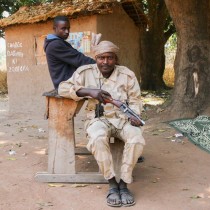
What the EU Can Learn From the AU About Protecting Children in War
the armed group of mostly Muslim fighters that had ousted the previous government, threatened to kill the students and teachers at her school. The school shut down. When Sophie, whose name we changed for her protection, spoke with Human Rights Watch researchers, she lamented the loss of her education, "I want to be a teacher, but without the school I can’t realize my dream,” she said. She is not alone–millions of childrenaround the world are denied an education because of war.
Protecting children during armed conflictwill be on the agenda next week in Abidjan, Côte d’Ivoire when African and European leaders gather with representatives from the African Union and European Union and other groups at asummit focusing on youth. African leaders know how urgent and important that issue is.
This year, theAfrican Committee of Experts on the Rights and Welfare of the Child, an expert body responsible for reviewing states’ compliance onchild rightsin Africa,released a studydocumenting the impact of conflicts and crises on children in Africa. The study makes for grim reading. It highlights numerousattacks on students, teachers, and schoolsin Mali and Nigeria, and the use of schools for military purposes in Somalia and Niger, to give just a few examples. The effect of this cannot be underestimated: schools destroyed, students and staff at risk of injury or death, and children exposed to risks such as sexual violence or forced labor.
There is hope for children like Sophie and the others.The Central African Republic isone of 71 countries, including 19 African Union and 20 EU states, that have endorsed theSafe Schools Declaration, an international political commitment that contains a number of concrete steps that countries can take to protect education during wartime. These include keeping schools open and operating during armed conflict, committing to investigate and prosecute war crimes relating to schools, and collecting data on attacks on, and military use of, schools and universities. Countries that endorse the Safe Schools Declaration also commit to minimize the military use of schools, such as for barracks, which can make schools targets for attack.
The African Union has played a leading role in encouraging the protection and continuation of education during wartime and has a lot it can share with the EU. Indeed, it has placed this at the heart of its strategy on children. TheAU Peace and Security Councilhas been instrumental in promoting the Safe Schools Declaration, urging all member countries to endorse iton several occasions. So far, it is the only regional organization to call for universal endorsement.
Several AU countries have already started taken action to make their schools safer during conflict. The Nigerian governmenthas improved security around schools and universities, including by digging ditches around schools and installing security lights. Niger has found alternative ways to educate displaced children, by using radio programs for those who cannot travel to school because of insecurity. South Sudan has legislation prohibiting the use of schools for military purposes. In 2016, security around exam sites meantstudents in Somalia could sit their examsfor the first time in several years. Andin July, African Union peacekeeping troops vacated the military base on the National University campus in Mogadishu, Somalia, that they had occupied for 10 years.
One of the key tenets of the Safe Schools Declaration is to share best practices and to develop political support for protecting schools and their students and teachers. Next week, the African Union has the opportunity to show the European Union exactly what it can do to help protect children like Sophie during times of war. It can share lessons on how African countries have been carrying out the Safe Schools Declaration at both the national and institutional levels.
The EU should consider what steps it can take, individually as well as with the AU, to encourage and help their own country and others to protect education during times of conflict. The AU and EU could also work together to ensure that all their troops ontraining missionsand peacekeeping missions commit not to use schools for military purposes. This is already a requirement for UN peacekeepers.
All children like Sophie have the right to learn in safety. The European Union should help do this by following the AU’s lead and commit to protecting the right to education for all children everywhere. That would be a major step toward investing in youth.
HRW.org
Leave a comment
| Copyright © 2009 - 2024 Sunatimes News Agency All Rights Reserved. |
| Home | About Us | Diinta | Reports | Latest News | Featured Items | Articles | Suna Radio | Suna TV | Contact Us |
 0
0 









What the EU Can Learn From the AU About Protecting Children in War
Fifteen-year-old "Sophie" was a student in the Central African Republic when the Seleka,